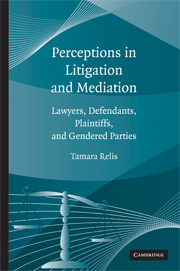Book contents
- Frontmatter
- Contents
- List of tables
- List of figures
- List of abbreviations
- Acknowledgments
- 1 Introduction
- 2 Great misconceptions or disparate perceptions of plaintiffs' litigation aims?
- 3 The voluntary versus mandatory mediation divide
- 4 Consequences of power: Legal actors versus disputants on defendants' attendance at mediation
- 5 Actors' mediation objectives: How lawyers versus parties plan to resolve their cases short of trial
- 6 Perceptions during mediations
- 7 Parallel views on mediators and styles
- 8 Conclusion: The parallel understandings and perceptions in case processing and mediation
- Bibliography
- Index
4 - Consequences of power: Legal actors versus disputants on defendants' attendance at mediation
Published online by Cambridge University Press: 21 August 2009
- Frontmatter
- Contents
- List of tables
- List of figures
- List of abbreviations
- Acknowledgments
- 1 Introduction
- 2 Great misconceptions or disparate perceptions of plaintiffs' litigation aims?
- 3 The voluntary versus mandatory mediation divide
- 4 Consequences of power: Legal actors versus disputants on defendants' attendance at mediation
- 5 Actors' mediation objectives: How lawyers versus parties plan to resolve their cases short of trial
- 6 Perceptions during mediations
- 7 Parallel views on mediators and styles
- 8 Conclusion: The parallel understandings and perceptions in case processing and mediation
- Bibliography
- Index
Summary
“A lot of times the defense will not bring the defendant. Now, this is against the case law. There have been rulings by the ADR Masters that everyone has to be there. So what happens is … I get the consent of all parties … that if someone's not there everyone consents to proceed; which is really the poor way.”
Male lawyer-mediator – mandatory mediation – in fifties“I have had but one physician attend out of in excess of 100 voluntary mediations … as a plaintiffs' counsel. So they just don't show up.”
Male, specialist plaintiff lawyer – in forties“The court-linked mediations … are not party-oriented. They're solution-oriented.”
Female non-lawyer-mediator – voluntary and mandatory mediations – in fortiesWhat was the real nature of these serious disputes that were proceeding down the litigation–mediation route? To whom did these cases belong? What did litigation-linked mediation mean to the lawyers, parties, and mediators involved? These questions emerge upon examining the issue of defendants' attendance at mediation. In exploring the views of legal actors and mediators, followed by a comparison of disputants' perspectives certain important realities become apparent. Yet, in looking deeper, the findings represent much more than simply a matter of mediation participation. Through the conduit of analysis on the attendance issue, the data additionally provide insight into the diverse purposes and meanings ascribed to mediation itself by each of its actor groups.
- Type
- Chapter
- Information
- Perceptions in Litigation and MediationLawyers, Defendants, Plaintiffs, and Gendered Parties, pp. 86 - 128Publisher: Cambridge University PressPrint publication year: 2009

